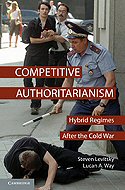|
Competitive Authoritarianism: Hybrid Regimes after the Cold War
|
|
Steven Levitsky, Lucan A. Way
|

|

Competitive authoritarian - regimes that combine competitive election with serious violation of democratic procedure - proliferated in the post-Cold War era. This book explains the rise and diverging fate of competitive authoritarian regimes since 1990. Based on a comparative study of 35 cases in Africa, Asia, the Americas, and post-communist Eurasia, the book finds that extensive ties to the West led to democratization. By raising the external cost of abuse, linkage to the West brought democracy even where domestic conditions were unfavorable. Where such ties were limited, external democratizing pressure was weaker. Regime outcomes In these cases hinged on the character of state and ruling-party organizations. Where incumbents possessed robust coercive and party structures, competitive authoritarian regimes were durable; where incumbents lacked such organizational tools, regimes were unstable but rarely democratized.
Steven Levitsky is Professor of Government at Harvard University. His research interests include political parties, political regimes, and informal institutions, with a focus on Latin America. Professor Levitsky is author of Transforming Labor-Based Parties in Latin America: Argentine Peronism in Comparative Perspective (2003); is co-editor of Argentine Democracy: The Politics of Institutional Weakness (2005) and Informal Institutions and Democracy: Lessons from Latin America (2006)
Lucan Way is an Assistant Professor of Political Science at the University of Toronto. His research interests include political regimes
and weak states with a focus on post-communist Eurasia. Professor Way is currently completing a book, Pluralism by Default: Sources of Political Competition in the Former Soviet Union, and has published articles in Communist and Post-Communist Studies, Comparative Politics, East European Politics and Societies, Journal of Democracy, Journal of Communist Studies and Transition Politics, Politics and Society, Post-Soviet Affairs, Studies in Comparative and International Development, and World Politics, as well as numerous book chapters. He is on the editorial board of the Journal of Democracy.
|
|
